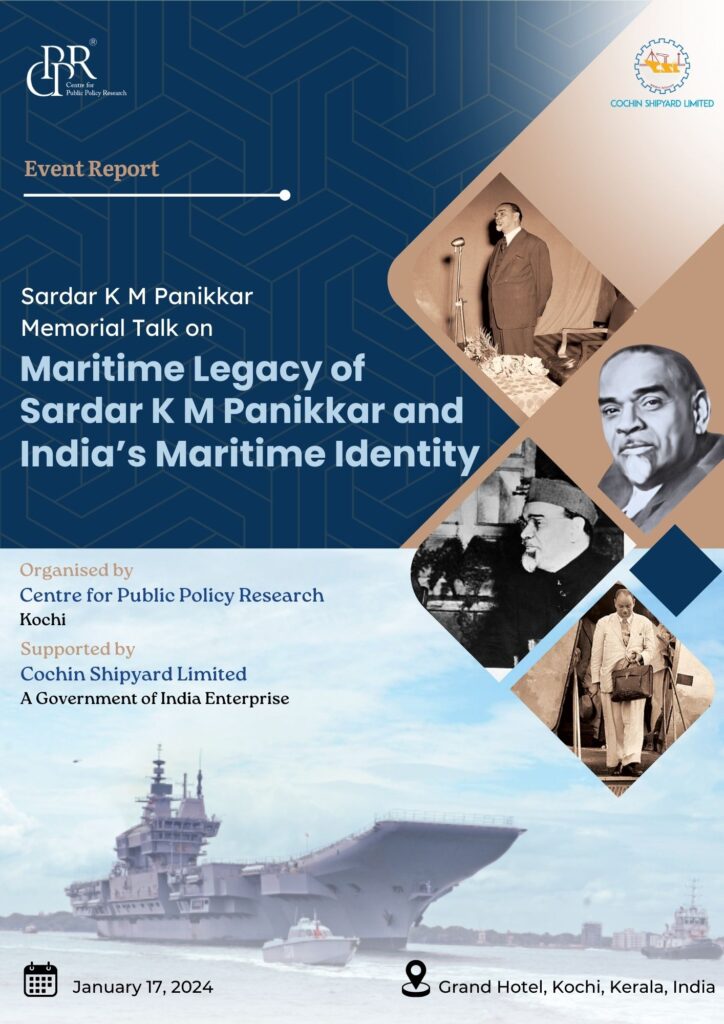All Events

Not just studies and jobs: Why Kerala’s youth choose to migrate
February 20, 2024
Liberalisation of Public Transport Ecosystem in India
February 23, 2024Cochin Shipyard Limited – CPPR | Memorial Talk on Maritime Legacy of Sardar K M Panikkar and India’s Maritime Identity
ABOUT THE EVENT
The Centre for Public Policy Research (CPPR), Kochi, with the support of Cochin Shipyard Limited, organised the ‘Sardar K M Panikkar Memorial Talk on the Maritime Legacy of Sardar K M Panikkar and India’s Maritime Identity’ on January 17, 2024. The event held at the Grand Hotel in MG Road, Kochi, from 5:00 to 7:00 pm was attended by over 125 persons cutting across academia, industry, media, maritime experts, and the general public. This memorial event aimed to pay homage to the maritime legacy of Sardar Panikkar, reflecting on his significant contributions to India’s maritime history. The discussion delved into Panikkar’s seminal works, such as ‘India and the Indian Ocean,’ examining his perspectives on India’s maritime identity and the evolution of its maritime strategy. The distinguished guest speakers at the event were Vice Admiral Anil Kumar Chawla, who retired as the Flag Officer Commanding-in-Chief of the Southern Naval Command, and Vice Admiral M P Muralidharan, former Director General of the Indian Coast Guard and an honorary distinguished fellow of maritime and defence studies at CPPR, both of whom provided profound insights into India’s maritime journey and its contemporary relevance.
KEY INSIGHTS FROM THE TALK
- The discussion emphasised the contemporary global focus on maritime affairs, underscoring the heightened significance of Sardar K M Panikkar’s contributions to maritime studies.
- India’s inseparable connection to maritime security since 1945 was highlighted, tracing back to the 15th century, with a particular emphasis on the strategic importance of air mastery for enhanced security.
- Panikkar’s writings in the post-colonial era of the 1940s and 1950s gain paramount relevance as India emerges from colonialism, shaping its maritime strategy.
- India’s historical maritime eminence, dating back to the 30th century BCE, was illuminated, citing the nation’s reach to Myanmar, Java, and Japan.
- Panikkar’s strategic mindset, particularly the strategic arch from Sapotra to Indonesia, was scrutinised, highlighting its contemporary manifestation and relevance.
- The symbiotic influence of Panikkar and Nehru on the development of the Indian Navy was emphasised, aiming for self-sufficiency in naval assets.
- Under Prime Minister Narendra Modi, India has taken monumental strides in becoming a maritime hub, with Cochin transforming strategically and gaining global attention.
- The Indo-Pacific vision, conceptualised by Panikkar over 150 years ago, aligns with contemporary geopolitical aspirations, reflecting Nehru’s balanced approach to land and sea.
- Panikkar’s enduring legacy includes his long-term policy envisioning India as a naval power maintaining supremacy in the Indian Ocean, aligning with Nehru’s strategic vision.
- Despite progress, VAdml Chawla acknowledged the considerable gap between India’s present maritime standing and the zenith it should occupy.
- Historical precepts were invoked to trace India’s maritime history, notably the nascent form of the Indian Navy in 1612 and British strategic utilisation of maritime routes during the 1856 mutiny.
- Panikkar’s vision encompassed the establishment of indigenous training institutions, a robust merchant marine, and a shipbuilding industry vital for India’s maritime standing.
- Cochin emerged as a training base for the Indian Navy under Panikkar’s influence, emphasising the holistic nature of maritime power. However, fiscal constraints perpetually hinder maritime development.
- Concerns were raised about China’s burgeoning maritime power and its geopolitical implications for India’s security, acknowledging the shift from conventional to unconventional warfare at sea.


